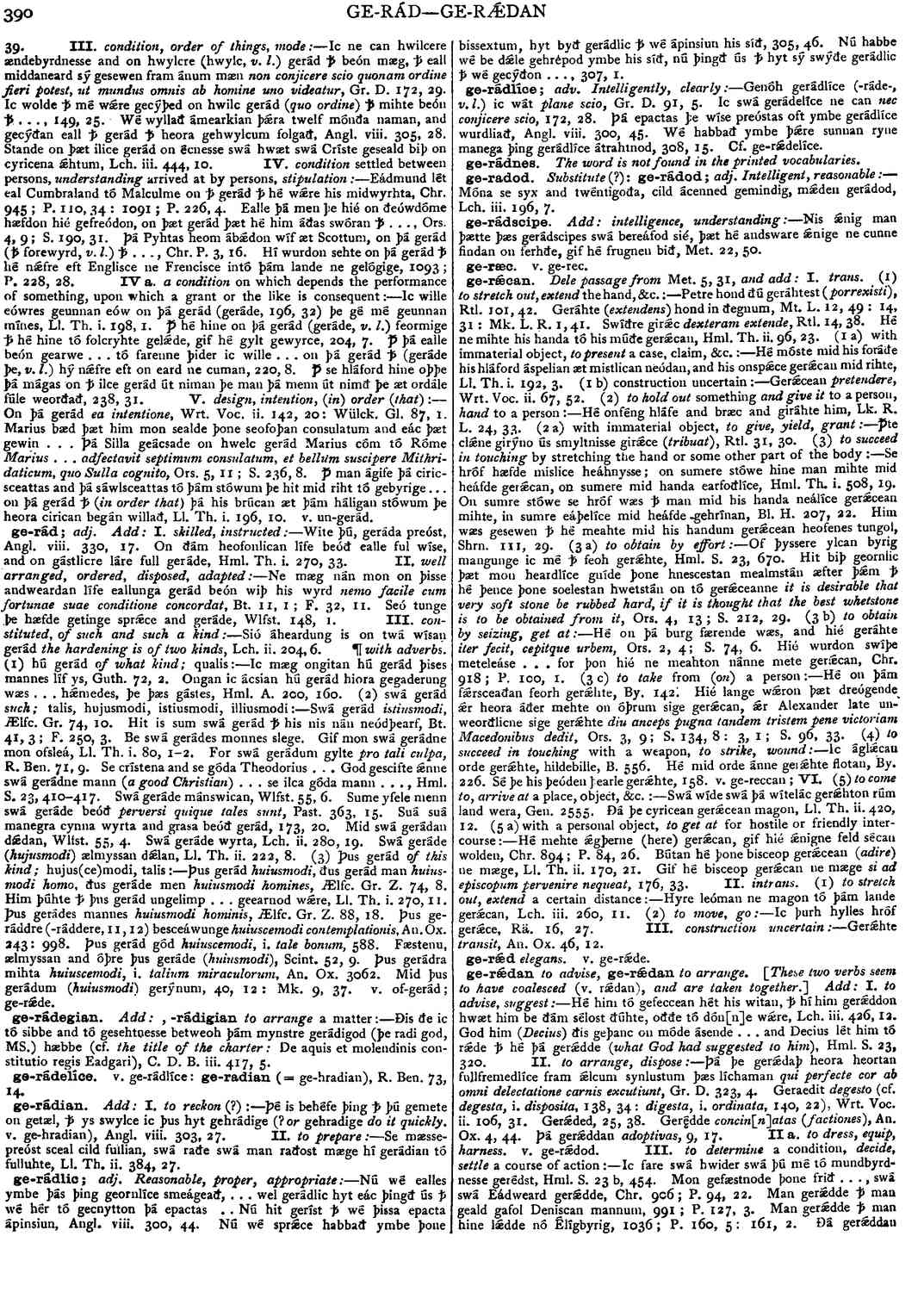ge-rǽcan
- verb
-
Petre hond ðúgeráhtest (
porrexisti
),- Rtl. 101, 42.
-
Geráhte
(extendens)
hond in ðegnurn,- Mt. L. 12, 49 : 14, 31: Mk. L. R. 1, 41.
-
Swíðre girǽc
dexteram extende,
- Rtl. 14, 38.
-
Hé ne mihte his handa tó his múðe gerǽcan, Hml. Th. ii. 96, 23. (l a) with immaterial object, to present a case, claim, & c. :-- Hé móste mid his foráðe his hláford áspelian æt mistlican neódan, and his onspǽce gerǽcan mid rihte, LI. Th. i. 192, 3. (l b) construction uncertain :-- Gerǽcean
pretendere,
- Wrt. Voc. ii. 67, 52.
-
Hé onféng hláfe and bræc and giráhte him, Lk. R. L. 24, 33. (2a) with immaterial object , to give, yield, grant :-- þte clǽnegirýno ús smyltnisse girǽce
(tribuat),
- Rtl. 31, 30.
-
Se hróf hæfde mislice heáhnysse; on sumere stówe hine man mihte mid heáfde gerǽcan, on sumere mid handa earfoðlice,
- Hml. Th. i. 508, 19.
-
On sumre stówe se hróf wæs ꝥ man mid his handa neálíce gerǽcean mihte, in sumre eáþelíce mid heáfde -gehrínan,
- Bl. H. 207, 22.
-
Him wæs gesewen ꝥ hé meahte mid his handum gerǽcean heofenes tungol, Shrn. m, 29. (3 a)
to obtain by effort
:-- Of þyssere ylcan byrig mangunge ic mé ꝥ feoh gerǽhte,- Hml. S. 23, 670.
-
Hit biþ geornlic þæt mon heaidlice guíde þone hnescestan mealmstáu æfter þǽm ꝥ hé þence þone soelestan hwetstán ou tó getǽceanne it is desirable that very soft stone be rubbed hard, if it is thought thai the best whetstone is to be obtained from it, Ors. 4, 13; S. 212, 29. (3 b ) to obtain by seizing, get at :-- Hé on þá burg færende wæs, and hié geráhte
iler fecit, cepitque urbem,
- Ors. 2, 4; S. 74, 6.
-
Hié wurdon swíþe meteleáse . . . for þon hié ne meahton nánne mete gerǽcan, Chr. 918; P. 100, l. (sc) to take from (on) a person :-- Hé on þám fǽrsceaðan feorh gerǽhte, By. 142: Hié lange wǽron þæt dreógende ǽr heora áðer mehte on óþrum sige gerǽcan, ǽr Alexander late unweorðlicne sige gerǽhte
diu anceps pugna tandem íristem pene vicloriam Macedonibus dedit,
- Ors. 3, 9; S. 134, 8 : 3, 1; S. 96, 33.
-
Ic áglǽcau orde gerǽhte, hildebille,
- B. 556.
-
Hé mid orde ánne gerǽhte flotau,
- By. 226.
- Sé þe his þeóden þearle gerǽhte, 158. v. ge-reccan ; VI.
-
Swá wíde swá þá wítelác gerǽhton rúm land wera,
- Gen. 2555.
-
Ðá þe cyricean gerǽcean magon, Ll. Th. ii. 420, 12. (5 a) with a personal object
, to get at
for hostile or friendly intercourse :-- Hé mehte ǽgþerne (here) gerǽcan, gif hié ǽnigne feld sécan wolden,- Chr. 894; P. 84, 26.
-
Bútan hé þone bisceop gerǽceau (
adire
) ne mæge,- Ll. Th. ii. 370, 21.
-
Gif hé bisceop gerǽcan ne mæge
si ad episcopum fervenire nequeat,
- 176, 33.
- Hyre leóman ne magon tó þám lande gerǽcan. Lch. iii. 260, 11,
-
Ic þurh hylles hróf gerǽce,
- Rá. 16, 27.
-
Gerǽhte
transit,
- An. Ox. 46, 12.
Bosworth, Joseph. “ge-rǽcan.” In An Anglo-Saxon Dictionary Online, edited by Thomas Northcote Toller, Christ Sean, and Ondřej Tichy. Prague: Faculty of Arts, Charles University, 2014. https://bosworthtoller.com/49285.
Checked: 0